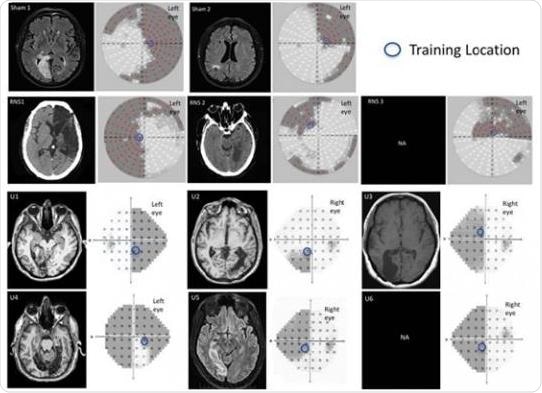A combination of visual training and a recently developed brain stimulation technique boosts learning in healthy adults and cortically blind patients, according to research published in JNeurosci.

Neuroradiological images and visual perimetries of CB patients. All patients sustained damage of early visual areas or the optic radiations resulting in homonymous visual field defects as shown by the visual field perimetries, next to each brain image. Credit: Herpich et al., JNeurosci (2019)
Lorella Battelli at the IIT-Istituto Italiano di Tecnologia and collaborators Krystel Huxlin and Duje Tadin at the University of Rochester demonstrate enhanced learning in healthy men and women with only 10 days of training. Transcranial random noise stimulation of early visual areas resulted in twice as much improvement on a visual motion task compared to other stimulation techniques or training alone. Surprisingly, the study found this enhanced learning persists for at least six months.
By extending their findings to patients who suffered a stroke or traumatic brain injury affecting their visual cortex, the researchers suggest this safe and painless two-pronged approach could lead to faster visual recovery and improved quality of life for this underserved patient population.
Source:
Society for Neuroscience
Journal reference:
Battelli, L. et al. (2019) Boosting learning efficacy with non-invasive brain stimulation in intact and brain-damaged humans. JNeurosci. doi.org/10.1523/JNEUROSCI.3248-18.2019.